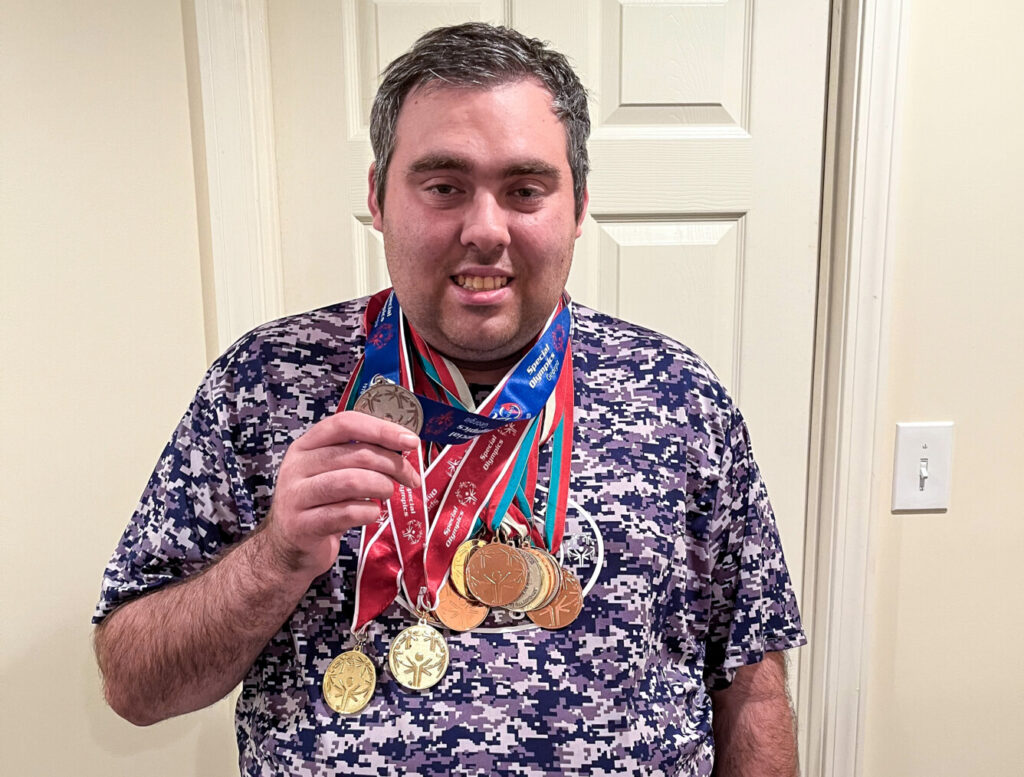More than ten years ago, in 2009, Eric participated in the Special Olympics Games for the first time. He still remembers his very first competition as if it were yesterday. To date, he has participated in multiple games, including bocce ball and swimming. However, his personal favorite is basketball. Most recently, Eric added a new gold medal to his impressive collection—an award he won during the Special Olympics Georgia Summer Games from the Track and Field competition. This recognition holds special significance for him. Eric’s mom, Anna Maki, who is the Director of Benefits Navigation at the Bobby Dodd Institute (BDI), is extremely proud of his achievements.
“Historically, he needed a unified partner. Somebody to walk with him, to keep him on track, stay focused, and maintain his energy. For him to do it himself, that is a big milestone. And for him to win the gold, that is awesome, too!”
Eric is a true believer in the Olympic principle. For him, it is not about winning the gold or any type of recognition; it is all about the fact that he has accomplished something, built new friendships, and been a part of an activity that brings him joy.
Special Olympics Georgia
Eric is one of the close to 18,000 athletes registered by Special Olympics Georgia (SOGA), a nonprofit organization providing year-round sports training and athletic competition for children and adults with intellectual disabilities in a total of 123 counties throughout the state. The age range of the athletes served by the organization is from two years old to 80+ years old.
“We believe that movement is the magic potion. Special Olympics Georgia is a movement, and it is a movement that is about sports training, competition. It is about sportsmanship, independence, and it really is about keeping your body in motion,” says Georgia Milton-Sheats, who is the President and CEO of SOGA.
Currently, with the addition of Cheerleading, SOGA offers a total of 27 different sports, ranging from Alpine Skiing to Bowling and Sailing. The organization is working on adding the popular sport of Pickleball to their extensive portfolio.
Out of these 27 activities, 24 are classified as unified sports. The goal of these programs is to bring together athletes with and without intellectual disabilities on the same team. In fact, Georgia was the second state, after Connecticut, to adopt the unified sports philosophy. Milton-Sheats explains, “We practice together. We play together. We give high fives together. It’s really a unified way for people to get involved and get to know the athletes.”
The Benefits of Sport for the Disability Community
Sport and movement are vital elements of physical and mental well-being. According to the Centers for Disease Control (CDC), a person should ensure they get at least 150 minutes of physical activity per week to maintain good health. It has been proven that sports have positive effects on the heart and lungs and are powerful stress reducers. Additionally, sports may help people living with disabilities develop independence, improve self-esteem, and build vital social skills.
A study published in 2009 found that physically active individuals with disabilities are more likely to be employed. They believe that being physically active has helped them advance in their jobs, leading to greater life satisfaction and a more sociable and positive outlook on their life prospects.
“It has been shown that athletes who have been involved with Special Olympics Georgia, or Special Olympics anywhere in the world, are proven to excel in their jobs and feel more confident. They ask more questions because they feel more assured of themselves. They do not goof off at work. They come to work on time. They want to be there. They do not call in sick unless they really cannot make it in. They are fabulous employees. Keep that in mind because you will not be disappointed,” says Milton-Sheats.
Eric is a perfect example. He has become an integral part of the Bobby Dodd Institute team. Eric works in the organization’s warehouse, assembling medical equipment before being delivered to one of the BDI business partners. This September, Eric will celebrate his first anniversary with the organization. He is always on time and ready to jump in to complete all his tasks. What he enjoys the most about his job is the new friendships he has built, but he is also very happy with the steady pay.
Special Olympics Georgia holds four big events each year, including Summer, Fall, and Winter Games, as well as a Horse Show coming up in October. Most recently, athletes attended the Special Olympics Games in Berlin, where they competed in sports like kayaking and sailing. “This really gives them a great experience and a sense of independence. It is amazing,” says Milton-Sheats, who was part of the delegation.
Staying Active May Be Challenging but Is Not Impossible
Despite the known benefits of sports and movement, only one in five (20%) adults with disabilities say they are involved or very involved with physical activities.
According to CDC, 41.6 percent of adults with a disability are obese, close to 22 percent smoke, approximately 10 percent have heart disease, and 15.9 percent have diabetes. Data provided by the United Nations shows that 93 percent of women with disabilities are not involved in sports, and women comprise only one-third of athletes with disabilities in international competitions.
Common barriers for disabled people to participate in sports include a lack of awareness among those without disabilities on how to include them, limited opportunities for training and competition, inaccessible facilities creating physical barriers, and limited resources.
Various measures have been taken to ensure the inclusion of people living with disabilities in sports and recreational activities. The Americans with Disabilities Act (ADA) is one such example that requires reasonable accommodations to be provided for people with disabilities to participate in sports or other activities. However, much more needs to be done.
How to Get Started
One way to get involved in physical activities is through Special Olympics. The process starts with a simple health screening that includes basic measurements such as blood pressure, height, weight, and other standard checks. Once the tests are performed, the results are valid for three years. There is no fee associated with becoming an athlete with Special Olympics Georgia.
The organization heavily relies on volunteers to provide coaching and other services to all registered athletes. As Georgia Milton-Sheats says, “We want people like you to come into the fold and be inspired.”
In addition to Special Olympics, there are several other organizations that provide opportunities for sports for people living with disabilities. These include Disabled Sports USA, Paralympics, Wheelchair Sports Federation, Shepherd Center, to name a few.
As organized sports may not be an option that everyone prefers, there are many other ways to put in those 150 weekly minutes as recommended by the CDC. One option is walking. As a matter of fact, SOGA highly encourages walking before and after competitions. Walking helps improve focus, reduces stress, and is an easy way to stay active with no investment or special preparations. Other options include wheelchair basketball, tennis, football, softball, and aquatic therapy, as suggested by CDC.
Sport is a medicine, and that is why it is important for us as a society to work on eliminating the existing barriers for the disability community to get involved in these activities.
“Please encourage movement and physical fitness because it’s good for all of us. And what I am told and what I believe over and over again, when you get to know our athletes, they’re super driven, super talented, so smart, and so positive. But when you get to know our athletes, they are more similar than they are different. And that is all they want. They want to be respected and they want to have a place to shine for their families, their friends, and themselves,” added Milton-Sheats.



